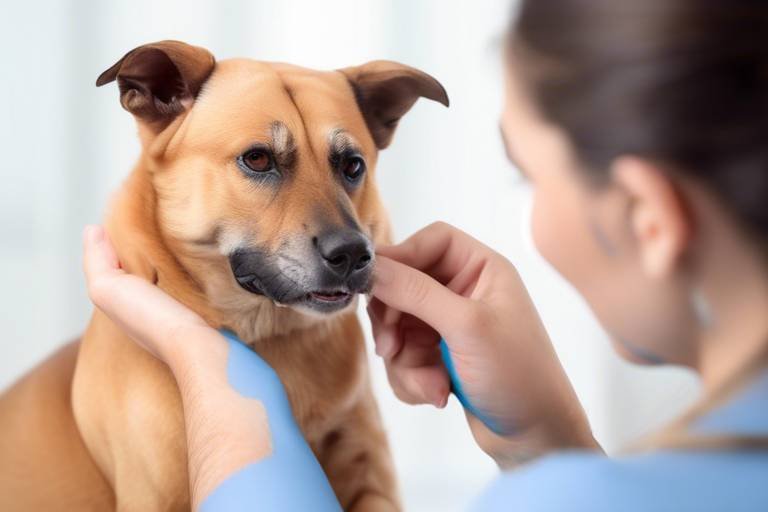Understanding Pet Dermatology - When to See a Specialist
When it comes to our furry friends, their health is our top priority. One area that often gets overlooked is pet dermatology. Just like humans, pets can suffer from a variety of skin conditions that can cause discomfort and distress. Understanding the complexities of pet dermatology is crucial for pet owners who want to ensure their companions are healthy and happy. This article will dive into the common skin issues pets face, the signs that indicate when it’s time to consult a specialist, and the importance of early intervention.
Many pet owners might wonder, "What exactly are the skin problems my pet could face?" The truth is, pets can experience a range of dermatological issues, from allergies to infections. These conditions can affect their quality of life, leading to persistent itching, discomfort, and even behavioral changes. By recognizing these problems early, you can take the necessary steps to get your pet the care it needs. So, let’s explore what these common skin issues are and how you can identify them.
Pets are prone to a variety of skin conditions, and being aware of these can help you act quickly. Some of the most prevalent skin issues include:
- Allergies: Pets can develop allergies to food, environmental factors, or even flea bites.
- Infections: Bacterial and fungal infections can complicate existing skin issues.
- Parasites: Fleas, ticks, and mites can lead to significant skin irritation and discomfort.
Each of these conditions can manifest in different ways, and understanding these signs is essential for pet owners. For instance, allergies might present as red, inflamed skin, while infections could result in pus or scabs. Observing your pet's behavior and physical condition can provide vital clues about their skin health.
Recognizing when your pet needs to see a specialist is crucial for effective treatment. Some key signs to look out for include:
- Persistent itching: If your pet is scratching or biting at their skin excessively, it’s time to investigate further.
- Hair loss: Spotting bald patches or thinning fur can indicate underlying issues.
- Skin lesions: Any unusual lumps, bumps, or sores should be evaluated by a professional.
These symptoms can be indicative of serious dermatological problems that require specialized care. Ignoring them can lead to worsening conditions and more complicated treatments down the line.
Allergies are a common culprit when it comes to skin issues in pets. They can manifest in various ways, making it essential for pet owners to be vigilant. Common allergens include:
- Food: Certain ingredients in pet food can trigger allergic reactions.
- Environmental factors: Pollen, dust mites, and mold can also cause issues.
- Flea bites: Even a single flea can lead to significant allergic reactions in sensitive pets.
Food allergies can lead to significant skin issues in pets. Identifying food-related skin problems often involves observing your pet's behavior and symptoms closely. If you notice your pet experiencing itchy skin, gastrointestinal upset, or chronic ear infections after eating, it may be time to consult your veterinarian about dietary changes. Sometimes, a simple switch to a hypoallergenic diet can work wonders.
Environmental factors can trigger allergic reactions in pets, leading to discomfort and skin irritations. Common environmental allergens include pollen, dust mites, and mold. If your pet seems to suffer more during certain seasons or after spending time outside, it might be worth exploring potential environmental allergies. Regular grooming and bathing can help alleviate some of these symptoms, but persistent issues may require specialized interventions.
Infections can complicate skin conditions in pets. Bacterial and fungal infections often arise as secondary issues when a pet's skin barrier is compromised. Symptoms may include redness, swelling, and discharge. If you notice these signs, it’s crucial to seek veterinary care promptly. Early intervention can prevent the infection from worsening and ensure your pet receives the appropriate treatment.
Understanding when to consult a veterinary dermatologist is crucial for effective treatment. There are specific situations that warrant immediate professional attention, such as:
- Chronic skin problems: If your pet has been battling skin issues for an extended period, it’s essential to seek specialized care.
- Unresponsive treatments: If your pet’s condition doesn’t improve with standard treatments, it’s time to consult a specialist for advanced diagnostics and tailored therapies.
Chronic skin issues often require specialized care. If your pet is dealing with ongoing skin problems that persist despite treatment, it’s time to consult a veterinary dermatologist. They can provide advanced diagnostics and treatment options that may not be available through your regular veterinarian.
If your pet’s skin condition doesn’t improve with standard treatments, it’s crucial to consult a specialist. Advanced diagnostics, such as skin biopsies or allergy testing, may be necessary to determine the root cause of the problem. Remember, your pet’s comfort is paramount, and timely intervention can make all the difference.
1. How can I tell if my pet has a skin condition?
Look for signs like excessive scratching, hair loss, or unusual skin lesions. If you notice these symptoms, it’s best to consult a veterinarian.
2. Are there home remedies for pet skin issues?
While some mild skin issues can be managed at home, it’s essential to consult a veterinarian for persistent problems to avoid complications.
3. How often should I take my pet to the vet for skin check-ups?
Regular check-ups are recommended, especially if your pet has a history of skin issues. Your veterinarian can provide a tailored schedule based on your pet’s needs.

Common Skin Conditions in Pets
When it comes to our furry friends, their skin health is often an overlooked aspect of their overall well-being. Just like humans, pets can suffer from a variety of skin conditions that can cause them discomfort and distress. Understanding these common issues is crucial for every pet owner, as early detection can lead to more effective treatment. Some prevalent skin conditions include allergies, infections, and parasites. Each of these can manifest in different ways, and recognizing the signs can make all the difference.
One of the most common culprits behind skin issues in pets is allergies. Pets can develop allergies to a myriad of substances, ranging from food ingredients to environmental factors like pollen and dust mites. When a pet is allergic, their immune system reacts strongly to these allergens, often resulting in itchiness, redness, and even swelling. This can lead to excessive scratching, which further complicates the situation by causing skin lesions or infections.
Infections are another significant concern for pet owners. Bacterial and fungal infections can arise as secondary issues when a pet's skin is compromised due to scratching or other irritants. For instance, a pet that has been scratching due to allergies may inadvertently introduce bacteria into their skin, leading to a more severe infection that requires veterinary intervention. Symptoms of infections can include pus-filled lesions, foul odors, and increased warmth in the affected area, all of which should prompt immediate attention.
Parasites such as fleas, ticks, and mites can also wreak havoc on a pet's skin. These tiny invaders not only cause irritation but can also transmit diseases that further complicate your pet's health. For example, flea infestations can lead to flea allergy dermatitis, a condition where the pet develops severe itching and inflammation due to an allergic reaction to flea saliva. Keeping an eye out for signs of parasites is essential, as these can often be treated effectively with preventive measures.
To summarize the common skin conditions pets may face, here's a quick reference table:
| Condition | Causes | Symptoms |
|---|---|---|
| Allergies | Food, pollen, dust mites | Itching, redness, swelling |
| Infections | Bacteria, fungi | Pus, odor, warmth |
| Parasites | Fleas, ticks, mites | Itching, hair loss, irritation |
Being aware of these common skin conditions can empower you as a pet owner. If you notice any signs of distress in your pet's skin, it's always best to consult with your veterinarian. They can provide a thorough examination and recommend the most appropriate treatment. Remember, early intervention is key to ensuring your pet remains happy and healthy!

Signs Your Pet Needs a Dermatologist
As a loving pet owner, it’s heart-wrenching to see your furry friend in discomfort. Sometimes, the signs are subtle, while other times they scream for attention. Understanding when your pet needs to see a dermatologist is crucial for their health and happiness. If your pet is exhibiting persistent itching, it's a clear signal that something isn’t right. Itching can lead to excessive scratching, which can cause skin damage and infections. If you notice your pet scratching or biting at their skin more than usual, it’s time to take notice.
Another red flag is hair loss. Whether it’s patchy or widespread, losing fur can indicate underlying issues that need professional evaluation. Hair loss can stem from allergies, hormonal imbalances, or even serious infections. Pay attention to the areas where your pet is losing hair; are they red or inflamed? These visual cues can help you determine the urgency of the situation.
Moreover, keep an eye out for skin lesions. If you spot any unusual growths, sores, or scabs on your pet’s skin, don’t ignore them. These lesions could be benign, but they could also indicate more serious conditions like tumors or severe infections. Remember, early detection is key in treating skin issues effectively.
Sometimes, the symptoms might not be as overt, but they can still signal a need for specialized care. For instance, if your pet is experiencing a foul odor coming from their skin or ears, it could be a sign of a bacterial or yeast infection. These infections can be stubborn and may require veterinary intervention to clear up completely.
In addition, if you find that your pet's skin problems are accompanied by changes in behavior, such as increased irritability or lethargy, these could be signs of discomfort that necessitate a visit to a dermatologist. Pets often hide their pain, so any behavioral changes should be taken seriously.
Ultimately, if your pet exhibits any combination of the following signs, it’s time to consult a veterinary dermatologist:
- Persistent itching or scratching
- Hair loss or bald patches
- Skin lesions or unusual growths
- Foul odor from skin or ears
- Behavioral changes indicating discomfort
Being proactive in addressing these signs can make all the difference in your pet’s quality of life. Remember, your pet relies on you to notice when something is off. Don’t hesitate to seek specialized help when needed; after all, a happy pet means a happy home!
Identifying Allergies in Pets
Allergies in pets can be as perplexing as trying to find a needle in a haystack. They can manifest in various ways, and understanding these signs is crucial for any pet owner. From incessant scratching to sudden skin rashes, allergies can turn your furry friend’s life upside down. But what exactly are these allergies, and how do they affect your pet's skin health? Let’s dive into the world of pet allergies, where knowledge is power and early detection is key.
Pets can be allergic to a range of substances, including food ingredients, environmental factors, and even certain materials they come into contact with. The most common allergens include:
- Food Ingredients: Proteins such as beef, chicken, and dairy are frequent culprits.
- Pollen: Seasonal allergies can flare up with the blooming of flowers and grasses.
- Dust Mites: These tiny creatures can cause havoc in your home, leading to allergic reactions.
- Fleas: A single flea bite can trigger severe allergic dermatitis in sensitive pets.
Identifying the source of an allergy can be a daunting task, often requiring a keen eye and a bit of detective work. For instance, if your pet is scratching more than usual or has developed red, inflamed patches on their skin, it may be time to investigate further. Keep a journal of your pet’s symptoms and any potential triggers, such as changes in diet, environment, or grooming products. This information can be invaluable when consulting with your veterinarian.
Moreover, allergies can lead to secondary infections if left untreated. When pets scratch or bite at their skin, they can create open wounds, which may become infected. This not only complicates the original allergy but can also lead to more serious health issues. Therefore, if you notice any of the following symptoms, it’s crucial to take action:
- Persistent itching or scratching
- Redness or swelling of the skin
- Hair loss or thinning fur
- Unusual odors emanating from the skin
In conclusion, identifying allergies in pets requires vigilance and an understanding of your pet’s behavior and health. If you suspect your pet is suffering from allergies, don’t hesitate to reach out to a veterinarian or a pet dermatologist. Early diagnosis and treatment can make a world of difference in your pet's quality of life.
Q: What are the most common signs of allergies in pets?
A: Common signs include persistent itching, redness or swelling of the skin, hair loss, and unusual odors.
Q: Can I treat my pet's allergies at home?
A: While some mild cases may be managed at home with dietary changes or over-the-counter medications, it’s always best to consult a veterinarian for a proper diagnosis and treatment plan.
Q: How are allergies diagnosed in pets?
A: Diagnosis typically involves a thorough examination, a review of the pet’s history, and sometimes allergy testing to identify specific allergens.
Q: What can I do to help my pet with allergies?
A: Keeping your pet's environment clean, using hypoallergenic products, and following a vet-recommended diet can help manage allergies effectively.
Food Allergies
When it comes to our furry companions, food allergies can be a sneaky culprit behind various skin issues. Imagine this: your pet is scratching away, and you think it’s just a seasonal itch. But what if the real problem lies in their food bowl? Food allergies in pets can lead to significant skin problems, and recognizing them early can save your pet from discomfort and you from a lot of worry.
So, how do you know if your pet is suffering from a food allergy? It often starts with symptoms like persistent itching, redness, and inflammation of the skin. You might notice that your pet is chewing at their paws or rubbing their face against the carpet. These signs can be subtle at first, but they can escalate quickly. In some cases, food allergies can also lead to gastrointestinal issues, such as vomiting or diarrhea, which can further complicate the picture.
One of the most common allergens for pets includes proteins found in their food. Here’s a quick rundown of the typical offenders:
- Beef
- Chicken
- Dairy products
- Eggs
- Wheat
- Soy
Identifying food allergies can be tricky because symptoms may not appear immediately after consumption. Sometimes, it can take days for a reaction to show up, making it hard to pinpoint the exact cause. A good way to tackle this issue is through an elimination diet, where you gradually remove potential allergens from your pet's diet and monitor their reaction. This method can be time-consuming but is often the most effective way to identify the culprit.
Once you’ve identified a food allergy, dietary changes become crucial. Switching to a hypoallergenic diet, which contains novel proteins and carbohydrates that your pet has never been exposed to, can significantly improve their skin health. Always consult your veterinarian before making any changes to your pet's diet, as they can provide tailored advice based on your pet’s specific needs.
In conclusion, food allergies can have a profound impact on your pet’s skin health. By being vigilant and observant, you can help your furry friend lead a more comfortable life. So the next time you notice your pet scratching more than usual, take a closer look at what’s in their food bowl—it just might be the key to solving their skin issues.
Q: How can I tell if my pet has a food allergy?
A: Look for symptoms such as persistent itching, red or inflamed skin, hair loss, and gastrointestinal issues. If these symptoms persist, consult your veterinarian.
Q: Can food allergies develop suddenly in pets?
A: Yes, food allergies can develop at any age, even if your pet has been eating the same food for years.
Q: What should I do if I suspect my pet has a food allergy?
A: Start by consulting your veterinarian. They may recommend an elimination diet to help identify the allergen.
Environmental Allergies
Environmental allergies in pets can be a real nuisance, not just for the furry friends but for their owners too. Imagine your beloved dog or cat scratching incessantly, their skin red and irritated, all because of something as simple as pollen or dust mites. These allergies occur when your pet's immune system overreacts to common environmental substances, leading to a variety of unpleasant symptoms. It's essential for pet owners to recognize these triggers, as they can significantly impact their pet's quality of life.
Common environmental allergens include:
- Pollen: Trees, grasses, and weeds release pollen into the air, which can be particularly problematic during certain seasons.
- Dust Mites: These microscopic creatures thrive in household dust and can cause allergic reactions year-round.
- Mold: Mold spores can be found both indoors and outdoors, especially in damp areas, and can provoke allergic responses.
- Fleas: While not an environmental allergen in the traditional sense, flea bites can lead to severe allergic reactions in sensitive pets.
When your pet is exposed to these allergens, they may exhibit symptoms such as:
- Persistent itching and scratching
- Red or inflamed skin
- Hair loss or bald patches
- Ear infections or inflammation
If you notice these signs, it’s crucial to take action. First, try to identify the specific allergen. Keeping a journal of your pet's symptoms and any environmental changes can help pinpoint triggers. For instance, if your pet's itching worsens during springtime, it could be pollen. On the other hand, if the symptoms persist throughout the year, dust mites may be the culprit.
Once you have an idea of what might be causing the allergies, consult your veterinarian. They may recommend allergy testing, which can help determine the exact allergen. This information is vital, as it allows for a tailored treatment plan that can include medications, special shampoos, or even immunotherapy. In some cases, simply changing your pet's environment—like using air purifiers or regularly washing bedding—can make a world of difference.
Understanding environmental allergies is not just about alleviating symptoms; it’s about enhancing your pet's overall well-being. With the right approach, you can help your furry friend lead a happier, healthier life, free from the discomfort of allergies.
Q: How can I tell if my pet has environmental allergies?
A: Look for signs such as excessive itching, red or inflamed skin, ear infections, or hair loss. If these symptoms persist, consult your veterinarian for further evaluation.
Q: What treatments are available for environmental allergies?
A: Treatments can include antihistamines, corticosteroids, special shampoos, and even immunotherapy in some cases. Your vet will recommend the best course of action based on your pet's specific needs.
Q: Can I prevent environmental allergies in my pet?
A: While you may not be able to prevent allergies entirely, you can minimize exposure by keeping your home clean, using air purifiers, and bathing your pet regularly to remove allergens from their coat.
Infections and Skin Issues
When it comes to our furry friends, skin issues can be more than just a nuisance; they can be a gateway to deeper health problems. Infections are a common complication that can arise from various skin conditions, and recognizing them early is crucial. Bacterial and fungal infections can wreak havoc on your pet's skin, leading to discomfort and more severe health issues if left untreated. Imagine your pet, scratching incessantly, only to find out that the underlying cause is an infection. It's like having an itch you can't scratch—frustrating and painful!
Bacterial infections often manifest as red, inflamed patches on the skin, sometimes accompanied by pus or scabs. If you notice your pet licking or biting at a specific area, it could be a sign of a bacterial infection. On the other hand, fungal infections, such as ringworm, can present as circular patches of hair loss, often with a scaly appearance. These infections can be contagious, not just to other pets but also to humans, so prompt attention is key.
Here are some common symptoms that might indicate your pet is suffering from a skin infection:
- Persistent itching or scratching: This can lead to self-trauma and exacerbate the infection.
- Redness or swelling: Inflamed areas can signal an infection brewing beneath the surface.
- Unpleasant odor: A foul smell can indicate a bacterial infection, often requiring immediate veterinary care.
- Hair loss: Patchy areas of hair loss can be a sign of fungal infections or other underlying issues.
It’s essential to understand that while some skin infections may seem minor, they can quickly escalate into more serious conditions if not addressed. For example, a simple scratch can become infected, leading to abscesses or systemic infections that affect your pet's overall health. Regular grooming and skin checks can help you catch these issues early. Think of it as a routine health check-up—just like we go to the doctor for a check-up, our pets need the same level of care!
If you suspect your pet has a skin infection, don’t hesitate to consult your veterinarian. They may perform tests, such as skin scrapings or cultures, to identify the specific type of infection and determine the best course of treatment. Early intervention can save your pet from unnecessary pain and suffering, ensuring they remain happy and healthy.
Q: How can I prevent skin infections in my pet?
A: Regular grooming, maintaining a clean environment, and ensuring your pet is up to date on vaccinations can help prevent skin infections. Additionally, keeping an eye on any skin irritations and addressing them promptly is crucial.
Q: What should I do if I notice a skin infection?
A: If you suspect your pet has a skin infection, contact your veterinarian immediately. They can provide a proper diagnosis and treatment plan tailored to your pet's needs.
Q: Are certain breeds more prone to skin infections?
A: Yes, some breeds are genetically predisposed to skin issues. Breeds with skin folds, such as Bulldogs and Pugs, may be more susceptible to infections due to moisture and bacteria trapped in their folds.
Q: Can I treat my pet's skin infection at home?
A: While some minor irritations can be managed at home, it's essential to consult your veterinarian for any suspected infections. They can recommend safe and effective treatments to avoid complications.

When to Seek a Specialist
Knowing when to seek the help of a veterinary dermatologist can be a game changer for your furry friend. It’s not just about having a skin issue; it’s about recognizing the severity and persistence of that issue. Many pet owners often wonder, "Is this something I can handle at home, or does my pet need specialized care?" The truth is, there are certain signs that clearly indicate it’s time to consult a specialist. Ignoring these signs can lead to prolonged discomfort for your pet and could potentially escalate into more serious health issues.
First and foremost, if your pet is experiencing chronic skin problems, it’s essential to seek specialized care. Chronic conditions are those that persist despite your best efforts to treat them at home. You might be using over-the-counter shampoos, topical treatments, or even home remedies, but if your pet's skin issues keep coming back, it’s a clear sign that they need a deeper level of care. Dermatologists have access to advanced diagnostics and can pinpoint the root cause of these persistent problems, leading to a more effective treatment plan.
Another critical moment to seek a specialist is when your pet's skin condition is unresponsive to standard treatments. If you’ve been following your veterinarian’s advice and your pet’s condition isn’t improving, don’t hesitate to ask for a referral to a dermatologist. Sometimes, what seems like a simple problem can be masking a more complicated issue, such as an underlying disease or a unique allergy. A specialist can provide tailored therapies that are more likely to yield positive results.
Here are some specific situations where you should consider consulting a veterinary dermatologist:
- If your pet is showing signs of severe itching that disrupts their daily life.
- Visible skin lesions that don’t heal or seem to worsen over time.
- Signs of hair loss that are not linked to seasonal shedding.
- Skin infections that keep recurring despite treatment.
- Any sudden changes in your pet’s skin condition, such as swelling or redness.
Ultimately, it’s about listening to your pet and being proactive about their health. If they seem uncomfortable or you notice any unusual symptoms, don’t brush it off. Just like humans, pets can suffer from a variety of skin conditions that require specialized care. Being attentive to their needs and recognizing when to seek help can make all the difference in ensuring they live a happy, healthy life.
Q: How do I know if my pet's skin condition is serious?
A: Look for signs like persistent itching, hair loss, or lesions that do not heal. If your pet seems uncomfortable or in pain, it’s time to consult a specialist.
Q: Can I wait to see if my pet's condition improves on its own?
A: While some minor issues may resolve themselves, waiting too long can lead to more severe problems. If you have concerns, it’s always better to be safe and consult a professional.
Q: What can I expect during a visit to a veterinary dermatologist?
A: Expect a thorough examination, possibly some diagnostic testing, and a tailored treatment plan based on your pet’s specific needs.
Chronic Skin Problems
Dealing with in pets can feel like navigating a maze with no exit. These persistent issues often leave pet owners feeling frustrated and helpless, especially when standard treatments fail to bring relief. Chronic skin conditions can stem from various underlying causes, including allergies, hormonal imbalances, or even autoimmune diseases. It's essential to recognize that what may seem like a simple itch could be a symptom of a more complex issue that requires specialized care.
When your furry friend is dealing with chronic skin problems, it’s crucial to observe their behavior closely. Are they scratching incessantly? Do they have red, inflamed patches on their skin? Such signs are not merely nuisances; they can indicate deeper health issues that need to be addressed by a veterinary dermatologist. Ignoring these symptoms can lead to secondary infections, which complicate the original problem and prolong your pet's discomfort.
One of the most common chronic skin conditions in pets is atopic dermatitis. This condition is often triggered by environmental allergens like pollen, dust mites, or mold. Pets suffering from atopic dermatitis may display symptoms such as:
- Persistent itching and scratching
- Red, inflamed skin
- Frequent ear infections
- Hair loss or thinning fur
Another chronic issue that pet owners may encounter is seborrhea, a condition characterized by flaky, oily skin. This can lead to a foul odor and further skin irritations. The treatment for seborrhea often involves medicated shampoos and dietary adjustments, but if these measures fail, consulting a specialist becomes imperative.
It's also worth noting that chronic skin problems can significantly impact your pet's quality of life. Imagine how uncomfortable it feels to have itchy skin—now multiply that by ten for your furry companion. Chronic skin conditions can lead to anxiety, depression, and even behavioral issues as pets become increasingly frustrated with their discomfort. Therefore, seeking help from a veterinary dermatologist can provide your pet with the relief they desperately need.
In summary, if your pet is suffering from chronic skin problems, don't hesitate to seek specialized care. A veterinary dermatologist can offer advanced diagnostics and tailored therapies to get your pet back to their happy, healthy self. Remember, early intervention can make all the difference in effectively managing chronic skin conditions.
Q: How do I know if my pet's skin issue is chronic?
A: If your pet has been experiencing skin problems for more than a few weeks and traditional treatments haven't worked, it may be chronic. Look for persistent symptoms like itching, redness, or hair loss.
Q: What should I do if my pet is scratching excessively?
A: Excessive scratching can lead to further skin damage. It's best to consult your veterinarian to determine the underlying cause and appropriate treatment.
Q: Are chronic skin problems common in certain breeds?
A: Yes, some breeds are more prone to skin issues due to genetic factors. Breeds like Bulldogs and Retrievers often experience skin allergies and other dermatological conditions.
Q: Can diet affect my pet's skin health?
A: Absolutely! Food allergies can lead to skin problems. If you suspect your pet has a food allergy, consult your vet for an elimination diet to identify the issue.
Unresponsive Treatments
When it comes to our furry friends, nothing is more distressing than watching them suffer from skin issues that just won’t budge. You’ve tried everything from over-the-counter creams to prescribed medications, yet the problem lingers. This is a clear signal that it’s time to consult a veterinary dermatologist. Why is it so important? Because specialized care can make all the difference in diagnosing and treating conditions that standard treatments simply can’t tackle.
Unresponsive treatments can stem from a variety of underlying issues. Sometimes, the initial diagnosis may not fully capture the complexity of your pet's condition. For instance, what might seem like a simple case of dermatitis could actually be a multifaceted problem involving allergies, infections, or even autoimmune disorders. It’s crucial to get to the root of the issue.
Veterinary dermatologists have the training and tools to conduct advanced diagnostics. They may perform skin scrapings, allergy tests, or biopsies to get a clearer picture of what’s going on. These tests help pinpoint the exact nature of the skin issue, allowing for a more tailored treatment plan. Here’s a quick overview of the diagnostic tools they might use:
| Diagnostic Tool | Purpose |
|---|---|
| Skin Scraping | To check for parasites like mites or fungal infections. |
| Allergy Testing | To identify specific allergens causing the reaction. |
| Skin Biopsy | To determine the presence of autoimmune diseases or tumors. |
Once the dermatologist has a comprehensive understanding of your pet's condition, they can recommend advanced therapies that go beyond the usual treatments. This might include immunotherapy for allergies, specialized medicated shampoos, or even systemic medications tailored to your pet’s unique needs. It’s all about finding what works best for your furry companion.
So, if you find yourself in a situation where your pet's skin condition is stubbornly unresponsive to treatment, don’t hesitate to reach out to a specialist. Remember, your pet deserves the best care possible, and sometimes that means seeking help from those who can provide targeted solutions.
- How do I know if my pet needs to see a dermatologist? If your pet has persistent skin issues that don’t improve with standard treatments, it’s time to consult a specialist.
- What are the common signs of skin problems in pets? Look out for symptoms like itching, redness, hair loss, and skin lesions.
- Can food allergies cause skin issues in pets? Absolutely! Food allergies can lead to significant skin problems, requiring dietary adjustments.
- What treatments can a veterinary dermatologist provide? They can offer advanced diagnostics and specialized therapies tailored to your pet’s specific condition.
Frequently Asked Questions
- What are the most common skin conditions in pets?
Pets can suffer from a variety of skin conditions, with the most common being allergies, infections, and parasitic infestations. Allergies can be triggered by food, environmental factors, or flea bites. Infections, whether bacterial or fungal, can also lead to significant skin issues, often requiring prompt treatment.
- How can I tell if my pet needs to see a dermatologist?
If your pet is experiencing persistent itching, hair loss, or skin lesions that don't improve with over-the-counter treatments, it's time to consult a veterinary dermatologist. Other signs include excessive scratching or licking, changes in skin color, or any unusual odor coming from the skin.
- What should I do if I suspect my pet has a food allergy?
If you think your pet might have a food allergy, the best approach is to consult your veterinarian. They may recommend an elimination diet, which involves removing potential allergens from your pet's diet and gradually reintroducing them to identify the culprit.
- Are environmental allergies common in pets?
Yes, environmental allergies are quite common in pets. Factors like pollen, dust mites, mold, and even certain grasses can trigger allergic reactions. These allergies often manifest as itchy skin or ear infections, so keeping an eye out for these symptoms is crucial.
- When should I consider seeking specialized care for my pet's skin issue?
If your pet has chronic skin problems that persist despite treatment, or if standard treatments aren't yielding results, it's time to seek specialized care. A veterinary dermatologist can provide advanced diagnostics and tailored therapies for more complex skin conditions.
- Can skin infections complicate my pet's dermatological issues?
Absolutely! Skin infections can worsen existing dermatological issues, making them more challenging to treat. Bacterial and fungal infections can occur alongside allergies and other skin problems, so it's essential to address them promptly to prevent further complications.



















